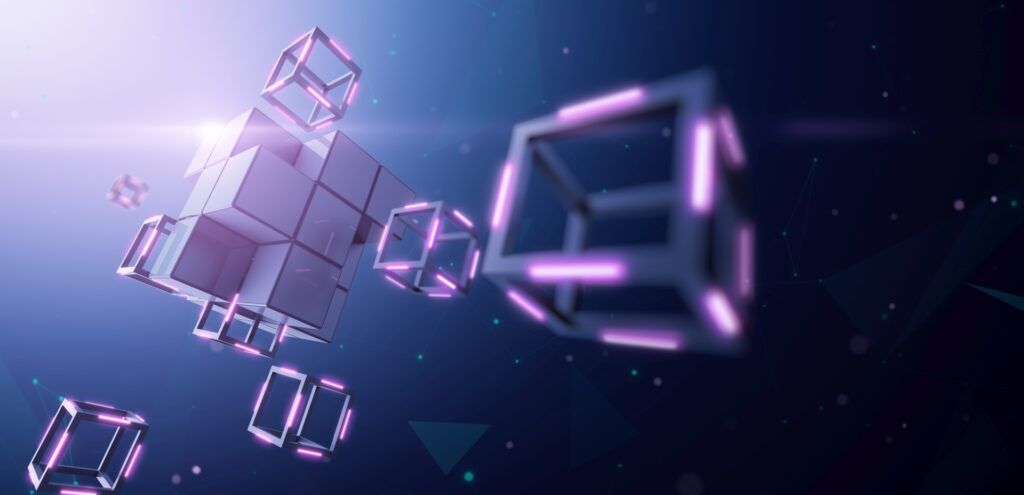Decentralized apps as the name suggests are software applications. Decentralized applications are also known as “Dapps”. The Dapps are a type of distributed application software that runs on either a blockchain network or on P2P- a Peer-to-peer network of computers.
Unlike other applications that run on a single computer, the Dapps are run on a network of computers which means they are not in the purview or control of a single authority. These decentralized apps can be used to build on the Ethereum platform for gaming, social media, finance, or developing other applications.
In other words, a simple software application such as Instagram or Facebook, or WhatsApp is used and developed over computers under an organization. The organization has full control over the application, the user data, and more. One single authority can change the software applications.
However, on the other hand, decentralized applications are open source, they operate without any single organization taking control over the application. The user data is recorded and open to the public, and the cryptographic tokens keep the network secure. For instance, applications like Tor, BitTorrent, etc are decentralized applications where multiple users are consuming, seeding, and feeding content or they are simultaneously performing both. These transactions, activities, etc., are recorded and are public.
What are the merits and demerits of decentralized applications?
Similar to other applications, decentralized applications have merits and demerits. Here is a list of benefits offered by the merits of decentralized apps:
Blockchain: One of the major benefits of Dapps is that they are based on blockchain which means cryptocurrencies can be integrated into apps easily. These apps can use cryptocurrencies as integrated payment methods or as basic functionalities of the app.
Centralized control: Another important benefit provided by Dapps is the centralized control offered by the apps. No organization has control over the apps which means not one individual can manipulate the app for their benefit.
Censorship resistance on the network: Decentralized apps built on the Ethereum network don’t provide any control to the government or powerful individuals. With zero failure points in the system, no individual or organization can take control of the network.
Never down: When a server for software applications is down, many users find it difficult to use. For instance, if the main server or the network of apps like Instagram, and Facebook is down, users across the globe find difficulty. Many such incidents have been reported in previous years. However, that’s not true with decentralized apps, even if a single part or computer of decentralized applications is hampered, the applications will continue to run. With decentralized apps, there is no point in failure.
Open source network: Decentralized applications are open source software which means any developer can add to features or built-in apps without hassle. Developers can make it more useful, and interesting, and contribute to the apps.
These are some of the benefits of decentralized applications. Apart from these, some of the demerits of decentralized applications:
Experimental: The first thing that makes decentralized apps lower is the issue of uncertainty. These apps are still in the development stage and can pose problems or issues that are unknown. Platforms like Ethereum are used to develop these apps, but they are still in the construction phase. Moreover, the uncertainty with rules and regulations of cryptocurrencies in different countries makes it difficult to understand its future.
High chances of hacking: This software is open source which means anyone can view their source code. Hackers can view their code, make manipulations and enter it into the app system. Many hackers are only looking for an opportunity to enter the system, any weakness can help.
The number of users: Another issue that Dapps are currently facing I the problem of the number of users. Dapps work effectively on a high number of users which means the higher users are using Dapps, the more interactive and effective services they can offer. Decentralized apps find it difficult to work with fewer users, it makes them slow and less interactive.
User-friendly interface: First of all, any web user uses apps for their usability and the interface. If the interface is complex, the end users get frustrated and switch to another platform. Dapps do not have much user-friendly interface, moreover, the rival apps with better user interfaces are providing facilities. So to get more users to use these apps, developers have to make them easy to use for end users.
Some major list of decentralized apps on blockchain platforms are:
Uniswap, Compound, Audius, Pooltogether, Decentraland, Gods Unchained, looks rare, etc used for purposes such as NFT power card game, music streaming, token swap, and more.
Final Thoughts: Decentralized apps are great innovations and can be effective. However, due to their disadvantages, they are uncertain. Moreover, they are in the developing stage which means many problems and issues are yet to be resolved.



